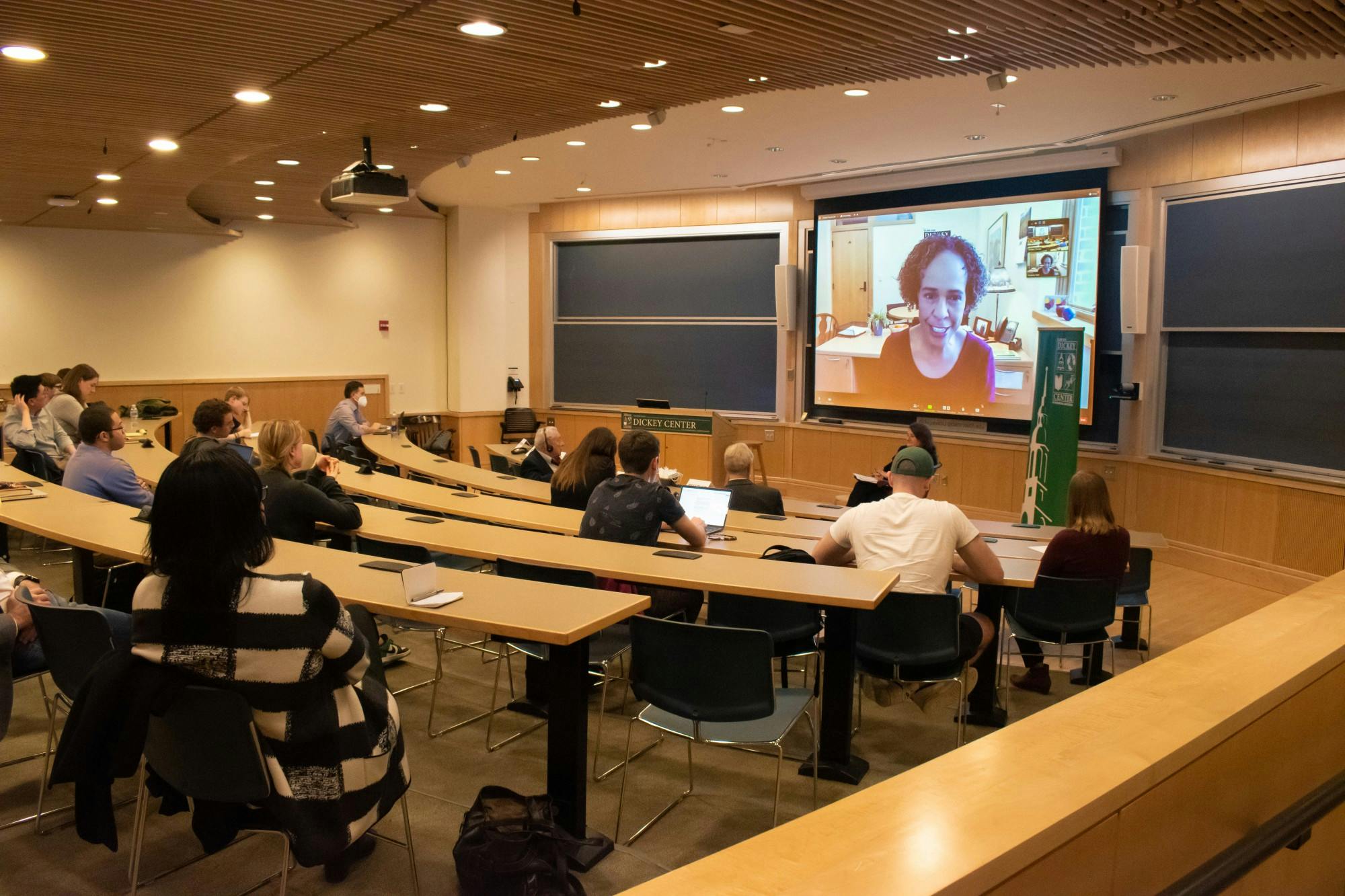Former United States ambassador to Niger Bisa Williams addressed some 40 students, faculty, alumni and guests in the Haldeman Center on Tuesday afternoon. She discussed the challenges of diplomacy in the 21st century and her career in the U.S. Department of State as a foreign service officer. The talk was titled “Pursuing Peace in Times of War: A Diplomat’s Efforts from Mali to Cuba to the UN.”
The director of the Dickey Center for International Understanding, Victoria Holt, opened the hybrid event with brief introductory remarks before Williams gave a short lecture. Afterwards, Williams answered a series of questions from Holt and turned to the audience for questions.
In her talk, which Williams delivered via Zoom due to concerns about COVID-19, the former ambassador discussed her extensive experience as a diplomat in Cuba, Mali, Panama and other nations during her career, which she said spanned three decades. She touched on the new challenges facing U.S. diplomacy, including the increasing strategic importance of diplomatic and economic relationships with African nations, a sphere which she said requires more attention.
Williams first highlighted the strengths of U.S. diplomacy abroad. She said that the U.S. does a good job spreading information about “the U.S. message,” which includes democracy and U.S. economic interests. She added that American diplomats have “no compunction” about meeting with “everyday people” across the socioeconomic spectrum and with civil society organizations abroad.
“Regular citizens have come to associate the American diplomat with a reachable person and with a person who is normally unafraid to speak truth to power,” she said.
However, Williams then delved into the various issues with U.S. diplomacy she identified during her diplomatic career, including communication problems in promoting democratic ideals abroad.
“When we want to explain, for example, why we think a country needs to open up the public square and allow for greater freedom of expression, we hit a brick wall,” she said. “I have not found that we have been agile enough to figure out more ways to be convincing.”
In discussing her role as an observer and U.S. representative to the 2014-2015 peace negotiations in Mali, she noted the importance of international guarantors in peace negotiations. Williams drew connections between her experience in Mali — where warring actors relied on drawing international attention to resolve the violence — to the ongoing Russian invasion of Ukraine.
“[President Volodymyr] Zelenskyy is asking the world, ‘What am I supposed to expect from the international community?’” she said. “‘Who is going to help guarantee our physical security and our ability to sustain ourselves as a sovereign nation when that is blatantly being assaulted?’”
More widely, Williams said that diplomats must wrestle with how to best support individuals in “deep trouble,” like refugees, persecuted groups and citizens of failed states. While she said the international community maintains “some measures,” like various human rights courts and the United Nations, she questioned such institutions’ efficacy.
“Are we using the instruments that we have established as an international community fully, accurately and in a way to build something that is lasting?” she asked. “That is part of what we are not quite getting right.”
Finally, Williams addressed the emerging importance of the African continent in international politics, which she said U.S. “adversaries” like China have already capitalized on.
“There is a strategic need for us to understand Africa a heck of a lot better than we do,” she said. “There is tremendous economic potential in improving our relations in Africa. Our competitors are making in-roads on the African continent and beginning to block U.S. access and prevent U.S. businesses from fair competition.”
Williams answered a series of audience questions, including from comparative literature and African and African American studies professor Ayo Coly, who inquired about how the U.S. negotiates “culturally sensitive issues” in Africa, like LGBTQ+ rights. Williams said that the U.S. advocates abroad for LGBTQ+ rights and on issues like female genital mutilation, partnering with local non-governmental organizations and speakers.
“We have been on the right side of those arguments and initiatives,” she said.
However, Williams noted the challenges which diplomats can face in pairing U.S. goals abroad with local belief systems, due to the influence of local authorities or traditional religious leaders. For example, she said that despite the professed “progressive” beliefs of governments like Niger, official policy or proclamations on a variety of issues, including women’s rights, often do not match the reality on the ground.
Katherine Goyette ’22 said that she attended the event because she is currently applying for jobs within the U.S. Foreign Service and is interested in “all of the events” related to the subject of foreign affairs.
“I really do believe in cultural communication and contact,” she said. “Having knowledge of people is the way to make a better world with less conflict and war.”
Tea Wallmark ’25 said that attending talks like Williams’ helps connect real-world events to academics.
“You have to bridge the information you are learning to information you are receiving outside of classes,” Wallmark said, adding that she is trying to “figure out” what she wants to do in her career.
In an emailed statement to The Dartmouth, Holt wrote that she appreciated Williams’ “frankness” about the complexity of supporting sustainable peace, and her discussion of the “human element” of working in international affairs.
Holt added that Williams demonstrates the breadth of experience and knowledge that is alive in today’s diplomats, many of whom, she wrote, come from “various backgrounds and interests, just like Dartmouth students.”




